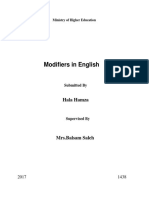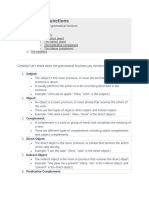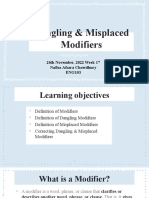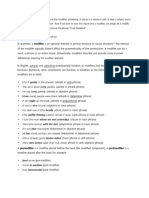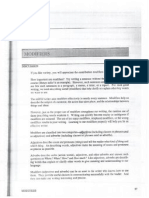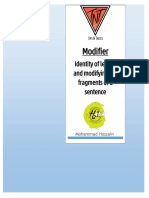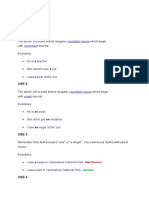In grammar, modifiers are words, phrases, or clauses that provide description in
sentences. Modifiers allow you to express your thoughts more clearly and make your
writing more interesting by adding detail. Here's a breakdown of different types of
modifiers and some important points about their usage:
1. Types of Modifiers
● Adjectives: Modify nouns or pronouns by describing, identifying, or quantifying
words. They are usually placed close to the words they modify.
● Example: The green apple fell from the tree.
● Adverbs: Modify verbs, adjectives, or other adverbs. They can describe how,
when, where, and how often something happens.
● Example: She sings beautifully.
2. Phrases as Modifiers
● Prepositional Phrases: Begin with a preposition and end with a noun or pronoun.
They act as adjectives or adverbs.
● Example: The book on the table is mine.
● Adverbial Example: He ran with great speed.
● Participle Phrases: Begin with a participle (a verb form used as an adjective).
They should be placed close to the noun they modify to avoid confusion.
● Example: Running toward the finish line, the athlete collapsed.
● Infinitive Phrases: Begin with "to" followed by a verb. They can act as adjectives,
adverbs, or nouns.
● Example: She had a suggestion to improve the process.
● Appositive Phrases: Rename or clarify a noun beside them.
● Example: Abraham Lincoln, the sixteenth President of the United States, is
famous for the Emancipation Proclamation.
3. Clauses as Modifiers
● Relative Clauses: Begin with relative pronouns like who, whose, which, or that.
They can be restrictive (defining the noun) or non-restrictive (adding extra
information).
● Example: The man who won the race is my neighbor.
� ● Non-restrictive Example: My bike, which I bought yesterday, is already
broken.
4. Dangling and Misplaced Modifiers
● Misplaced Modifiers: When a modifier is not placed correctly in the sentence, it
can lead to ambiguity or confusion.
● Misplaced Example: She almost drove her kids to school in her pajamas.
● Corrected: In her pajamas, she almost drove her kids to school.
● Dangling Modifiers: These are words or phrases that do not clearly point to the
word or words they modify, often because the word they should modify is
missing from the sentence.
● Dangling Example: After reading the original study, the article remains
unconvincing.
● Corrected: After reading the original study, I find the article unconvincing.








